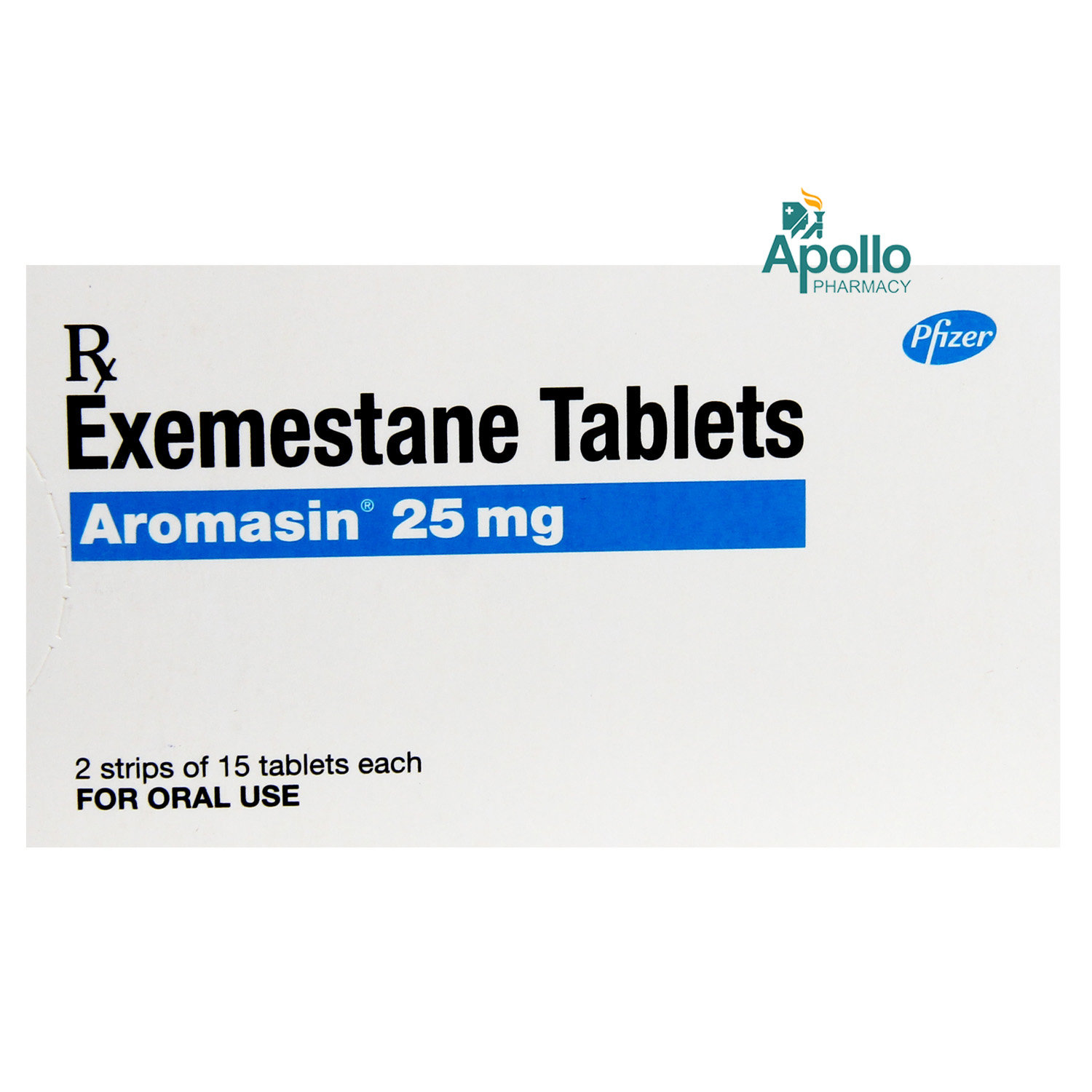Exemestane
About Exemestane
Exemestane belongs to the group of anti-cancer medicines called aromatase inhibitors used to treat breast cancer in women who have gone through menopause (cessation of menses periods). Breast cancer is a type of cancer that develops in breast cells stimulated by the female sex hormone known as estrogen.
Exemestane works by blocking the aromatase enzyme, which produces the estrogen hormone. Thus, it lowers the amount of estrogen (natural female hormone) produced in the body. The cancer cells require estrogen for their growth. Hence, blocking the aromatase enzyme, Exemestane prevents the growth of cancer cells. Together, Exemestane helps prevent or stop the growth of spreading the tumours (cancer cells) to other body parts.
Take Exemestane as prescribed by your doctor. You are advised to take Exemestane for as long as your doctor has prescribed it for you, depending on your medical conditions. In some cases, you may experience common side effects such as insomnia (difficulty sleeping), nausea, headache, musculoskeletal (bone, muscle, or joint) pain, increased sweating, and fatigue. Most of these side effects of Exemestane do not require medical attention and gradually resolve over time. However, if the side effects are persistent, reach out to your doctor.
Exemestane should not be taken in conditions like liver and kidney disease. Talk to your doctor before taking Exemestane if you have any type of allergy with Exemestane or any part of Exemestane. If you have not yet gone through menopause, i.e. if you still have periods, then immediately inform your doctor before taking Exemestane. Exemestane should not be taken If you are pregnant or planning to become pregnant or breastfeeding. Exemestane causes weakness and dizziness, so drive only if you are alert. Avoid consuming alcohol with Exemestane as it could lead to increased drowsiness and dizziness. Exemestane should not be given to children as safety has not been established.
Uses of Exemestane
Medicinal Benefits
This Exemestane is used to treat specific types of breast cancer in women after menopause. Exemestane is also used to help avoid cancer from returning. Some breast cancers are made to grow faster by a natural hormone known as estrogen. Exemestane works by blocking the aromatase enzyme, which is involved in producing the estrogen hormone. Therefore, Exemestane lowers the amount of estrogen in the body. Exemestane helps prevent or stop the growth of spreading the tumours (cancer cells) to other body parts.
Directions for Use
Storage
Side Effects of Exemestane
-
Insomnia (difficulty in sleeping)
-
Nausea
-
Headache
-
Musculoskeletal (bone, muscle or joint) pain
-
Increased sweating
-
Fatigue
Drug Warnings
To treat your condition effectually, continue taking Exemestane for as long as your doctor has prescribed. Do not stop Exemestane midway. Do not take Exemestane if you are allergic to any of its contents. Exemestane should not be taken in conditions like liver and kidney disease. Before taking Exemestane inform your doctor if you have osteoporosis, as Exemestane may increase your risk of developing osteoporosis. If you have not yet gone through menopause, i.e. if you still have periods, then immediately inform your doctor before taking Exemestane. Exemestane should not be taken If you are pregnant or planning to become pregnant or breastfeeding. Exemestane causes weakness and dizziness, so drive only if you are alert. Avoid consuming alcohol with Exemestane as it could lead to increased drowsiness and dizziness. Exemestane should not be given to children as safety has not been established. Exemestane may have an intolerance to some sugar. Inform your doctor before taking this Exemestane.
Drug Interactions
Drug-Drug Interactions: Exemestane may interact with an antibiotic (rifampicin), and medicines used to treat fits/epilepsy (carbamazepine, phenytoin).
Food-Drug Interactions: No food interaction was found.
Drug-Disease Interactions: Exemestane should not be given to patients with osteoporosis and vitamin D deficiency.
Drug-Drug Interactions Checker List:
Safety Advice

Alcohol
cautionYou are recommended to avoid alcohol consumption while taking Exemestane to avoid unpleasant side effects. Alcohol intake, along with Exemestane, may cause increased drowsiness.

Pregnancy
unsafeExemestane should not be used during pregnancy because it causes harm to your fetus (newborn baby). Please consult your doctor about any concerns regarding this. Your doctor will weigh the benefits and any potential risks before prescribing it.

Breast Feeding
unsafeExemestane should not be taken during breastfeeding as it may harm your baby. Please consult your doctor about any concerns regarding this. Your doctor will weigh the benefits and any potential risks before prescribing it.

Driving
unsafeExemestane may cause dizziness and drowsiness, do not drive or operate heavy machinery if you feel dizzy.

Liver
cautionIf you have or had a history or evidence of any liver diseases, please consult the doctor before taking Exemestane. Your doctor may adjust the dose or prescribe a suitable alternative based on your condition.

Kidney
cautionIf you have or had a history or evidence of any kidney diseases, please consult the doctor before taking Exemestane. Your doctor may adjust the dose or prescribe a suitable alternative based on your condition.

Children
unsafeExemestane should not be used by children, as efficacy and safety have not been established.
Habit Forming
Diet & Lifestyle Advise
- Eat a healthy diet and exercise regularly to maintain proper weight.
- Avoid smoking and alcohol consumption.
- Include leafy vegetables, citrus fruits, fatty fish, berries, yoghurt, apples, peaches, cauliflower, cabbage, broccoli, beans, herbs, and spices in your diet.
- Avoid fast, fried, processed meats, refined carbs, and added sugar.
- Get optimal sleep, rest well.
Special Advise
- Your doctor may advise you to regularly measure body density before, during and after the treatment as Exemestane may cause bone thinning due to the reduction of estrogens in the body.
- Exemestane should be taken under strict medical supervision. The doctor will regularly monitor your condition while taking Exemestane.
Patients Concern
Disease/Condition Glossary
Breast cancer is a type of cancer that develops in breast cells stimulated by a female sex hormone called estrogen. Breast cancer may form in lobules (glands that produce milk), ducts of the breast (the pathway that brings milk from glands to the nipple), fatty tissue, or fibrous connective tissue within the breast. The tumour cells invade other healthy breast cells and travel to lymph nodes which are a primary pathway for the cancer cells to move to other parts of the body. Symptoms of breast cancer include a lump in the breast or tissue thickening which feels different than the normal surrounding tissues, breast pain, redness, swelling, nipple discharge other than breast milk, bloody discharge, unexplained change in shape, size or appearance of the breast, peeling, flaking or scaling of the skin, and a lump or swelling under the arm.
FAQs
The most common side effects of using Exemestane are hot flashes, joint pain, feeling tired, trouble sleeping, headache, depression, increased sweating, upset stomach, feeling anxiety, and difficulty in breathing. If any of these side effects disturb you, inform your doctor.
The common symptoms of breast cancer involve the presence of a lump in the breasts that feels dissimilar from the rest of the breast tissue. You may observe changes in the size, shape and appearance of the breast. The nipple becomes enlarged and painful, and discharge is also one of the symptoms of breast cancer. Pain occurs around the breast.
Yes, Exemestane commonly affects the hair by making them thin, which further causes loss of hair. However, it is not very common. Hair reduction possibly happens due to the estrogen-lowering effect of Exemestane. These effects are not long-lasting and may return after some time. If it matters to you, inform your doctor of another alternative medicine to avoid harm to hair.
Exemestane causes dizziness and drowsiness. So, drive only if you are alert and omit driving or operating machinery if you feel dizzy or drowsy.
Although there is no known way to prevent breast cancer, there are ways to lower your risk. It is advisable to drink less alcohol, stay at a healthy weight, get regular exercise, breastfeed (completely breastfeeding during your baby's first 6 months and continuing for 12 months or longer), and inform your doctor about hormone replacement therapy (a form of hormone therapy used to treat symptoms related with female menopause) if you take it.





